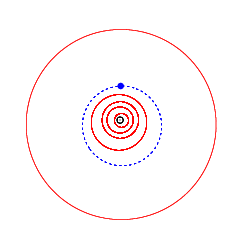(9939) 1988 VK
|
| |||||||||||||
| Discovery | |||||||||||||
|---|---|---|---|---|---|---|---|---|---|---|---|---|---|
| Discovered by | T. Kojima | ||||||||||||
| Discovery date | 3 November 1988 | ||||||||||||
| Designations | |||||||||||||
| MPC designation | (9939) 1988 VK | ||||||||||||
| 1991 PH1 | |||||||||||||
| Orbital characteristics[1] | |||||||||||||
| Epoch 13 January 2016 (JD 2457400.5) | |||||||||||||
| Uncertainty parameter 0 | |||||||||||||
| Observation arc | 9993 days (27.36 yr) | ||||||||||||
| Aphelion | 2.5358622 AU (379.35959 Gm) | ||||||||||||
| Perihelion | 1.8555125 AU (277.58072 Gm) | ||||||||||||
| 2.1956874 AU (328.47016 Gm) | |||||||||||||
| Eccentricity | 0.1549286 | ||||||||||||
| 3.25 yr (1188.4 d) | |||||||||||||
| 146.44052° | |||||||||||||
| 0° 18m 10.563s / day | |||||||||||||
| Inclination | 5.782563° | ||||||||||||
| 110.23934° | |||||||||||||
| 268.39518° | |||||||||||||
| Earth MOID | 0.866599 AU (129.6414 Gm) | ||||||||||||
| Jupiter MOID | 2.93434 AU (438.971 Gm) | ||||||||||||
| Physical characteristics | |||||||||||||
| |||||||||||||
| 14.3 | |||||||||||||
|
| |||||||||||||
(9939) 1988 VK is a main belt asteroid. It orbits the Sun once every 3.25 years.[1] It is associated with the Flora family of asteroids.[2]
Discovered on November 3, 1988, by Takuo Kojima at the YGCO Chiyoda Station, it was given the provisional designation "1988 VK".[3]
References
- 1 2 "JPL Small-Body Database Browser: 9939 (1988 VK)". NASA/Jet Propulsion Laboratory. Retrieved 5 April 2016.
- ↑ Zappalà, Vincenzo; Bendjoya, Philippe; Cellino, Alberto; Farinella, Paolo; Froeschlé, Claude (1997). "Asteroid Dynamical Families.". EAR-A-5-DDR-FAMILY-V4.1. NASA Planetary Data System.
- ↑ MPO 47637 Minor Planet Center
External links
This article is issued from Wikipedia - version of the 9/9/2016. The text is available under the Creative Commons Attribution/Share Alike but additional terms may apply for the media files.
